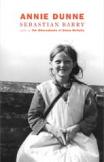All in the Family
Sebastian Barry first made his mark as a writer with The Steward of Christendom, a play about his grandfather, who rose from the ranks to become a superintendent of the Irish police force in Dublin under British rule, but quickly fell into disrepute and dejection with its passing. It made the rounds from Dublin and London to New York and Sidney with considerable critical acclaim. Subsequently, he published The Whereabouts of Eneas McNulty, his well-received first novel in which the police again play a significant role.
Annie Dunne, set in 1959, represents a direct return to the family tree, concentrating now on one of the superintendent’s daughters, who suffers from a spinal defect that has left her with a permanently bent back and a great sense of worthlessness. Annie’s world is small, her concerns specific. Having been turned out as housekeeper by a beloved nephew when he remarried, she has been taken in by Sarah, a single cousin living on a small farm in a remote area of County Wicklow, only a few miles from Dublin but as primitive then as the west of Ireland.
Into their solitary lives one summer come two young children, Annie’s great-grand-niece and -nephew, ages six and four, grandchildren of the man who had sent her packing from Dublin. Their parents have gone to establish themselves in London, where they hope to settle and bring their son and daughter to live. It is a summer tale, but not always a sunny one. At one point Annie comes upon the two children playing a strange game on their bed that seems far beyond their years.
But even more troubling to Annie is Billy Kerr, a ne’er-do-well who does odd jobs for Annie’s female cousins on their farm several miles down the road, but who is beginning to show a great interest in Sarah. Annie is convinced he’s after the property and dreads another eviction, but can find no clear way to oppose him.
In the midst of all these dilemmas, the daily drudgery of the farm must go on, and Barry is very good at depicting the hard life of a small holding long before electricity and central heating came to rural Ireland. But there are also moments of high hilarity and deep pathos with the children, who introduce the unexpected into these women’s ordinary routines. One escapade by the boy leads Annie to tell him of a story of her father’s childhood. His dog had killed a sheep, and his father, the steward of the estate, had told him the dog must be put down. Instead, the future superintendent of police fled to the hills with the animal. A search party from the estate was formed, and eventually the boy and the dog were found. The boy feared a terrible whipping but instead his stern father embraced him with the joy of the Prodigal’s sire; on hearing it, the other young truant says, “with a strain of desperation...love.” By the end of the novel he, too, will set the neighbors searching, because he feels falsely accused by Annie, and this time it is the women’s old dog who searches him out.
This short novel, a drama every bit as convoluted as Barry’s earlier play, revolves around the hurts we do one another within the confines of family, but focusing now on the fragile innocence of the family’s youngest members and the unhealed wounds of their elders. Annie’s triumph at the end comes in her wise restraint. She will not let her fears and suspicions start a new round of hurts. And her reward is Sarah’s rejection of Billy Kerr for his threats to harm the children as a way of getting back at Annie. Tragedy is averted, and the sweet circle of comedy returns the players to their proper partners: children to their father; Annie and Sarah to their chaste sisterhood.
This article also appeared in print, under the headline “All in the Family,” in the December 23, 2002, issue.








